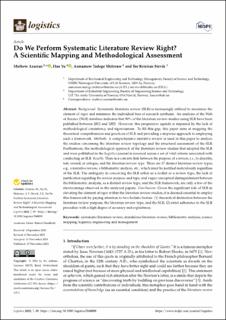| dc.description.abstract | Background: Systematic literature review (SLR) is increasingly utilized to maximize the element of rigor and minimize the individual bias of research synthesis. An analysis of the Web of Science (WoS) database indicates that 90% of the literature review studies using SLR have been published between 2012 and 2022. However, this progressive agenda is impaired by the lack of methodological consistency and rigorousness. To fill this gap, this paper aims at mapping the theoretical comprehension and practices of SLR and providing a stepwise approach to employing such a framework. Methods: A comprehensive narrative review is used in this paper to analyze the studies concerning the literature review typology and the structural assessment of the SLR. Furthermore, the methodological approach of the literature review studies that adopted the SLR and were published in the Logistics journal is assessed across a set of vital criteria associated with conducting an SLR. Results: There is a concrete link between the purpose of a review, i.e., to describe, test, extend, or critique, and the literature review type. There are 17 distinct literature review types, e.g., a narrative review, a bibliometric analysis, etc., which must be justified meticulously regardless of the SLR. The ambiguity in conceiving the SLR either as a toolkit or a review type, the lack of justification regarding the review purpose and type, and vague conceptual distinguishment between the bibliometric analysis, as a distinct review type, and the SLR framework, are only a few of the shortcomings observed in the analyzed papers. Conclusions: Given the significant role of SLR in elevating the element of rigor within the literature review studies, it is deemed essential to employ this framework by paying attention to two holistic factors: (1) theoretical distinction between the literature review purpose, the literature review type, and the SLR; (2) strict adherence to the SLR procedure with a high degree of accuracy and explicitness. | |
